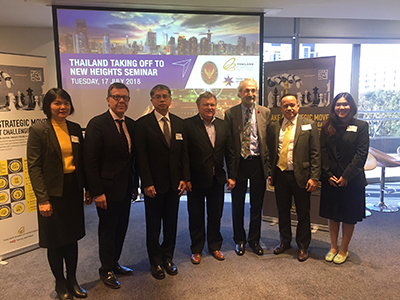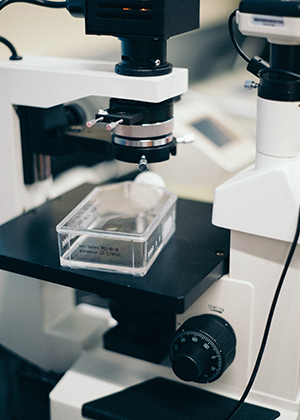Thailand: now a prime destination for biotech development
By Ellen Boonstra, Asia correspondent >>
BIOTECHNOLOGY in Thailand has been through more than three decades of development and the country is now regarded by many as being poised to take a lead in the sector.
Today, with its superb infrastructure, substantial scientific capability and strategic location in the centre of the South East Asia region, Thailand is home to many well-established world technology labs and pharmaceutical companies – and is ready to embrace new waves of advanced biotech development.
Becoming a bio-economy leader is also a new ambition of Thai Government, one of 10 targeted growth-engine industries under the new ‘Thailand 4.0’ growth model, which focuses on the concept of inclusive, productive and green growth to enhance the country’s competitiveness and economic development.
Biotech companies in Thailand enjoy a variety of competitive advantages from supporting ecosystems including intellectual property protections and a technically equipped workforce, as well as an abundance of natural resources and rich biological diversity. 
DIVERSE NATURAL RESOURCES
The first key advantage Thailand has, to be a research hub for biotechnology, is the country’s hot and humid climate, which supports tropical ecosystems in which a large variety of plant, animal and microbe species thrive.
The kingdom has about 15,000 species of plants, which account for around 10 percent of the estimated total number of plant species found globally.
Moreover, abundant farmland across the country and a year-round growing season allow agricultural raw materials to be sourced locally at low prices.
Meanwhile, the Thai agricultural sector, the mainstay of the country’s socio-economic foundation, is currently transitioning to ‘Smart Farming’, a key reforming process endorsed by the government to increase the efficiency of agricultural production and enhance cooperation between farmers and the public and private sectors.
R&D INFRASTRUCTURE
Thailand has developed networks of organisations that support research and development in biotech.
Currently, 24 universities across the country have the combined capacity to supply about 7,000 students with a biotechnology background each year.
In addition, well-established research infrastructure, including various pilot plants located in several leading universities across the country, allow biotech companies to scale up their research before commercialising their innovations.
Many of these pilot plants operate as private-public sector partnerships, such as the Agricultural Research Development Agency (ARDA) under the Ministry of Agriculture. 
PUBLIC-PRIVATE SUPPORT
Government and organisational support is provided through the National Science and Technology Development Agency (NSTDA), which offers government support by acting as a bridge between the requirements of academic research and innovation in the industry.
This occurs through the operation of four national research centres: BIOTEC, MTEC, NANOTEC, and NECTEC, and one technology management centre (TMC).
Thailand Science Park (TSP), the first technology and innovation hub of Thailand, serves as a one-stop service centre to assist both foreign and local companies engaged in scientific and technological research.
TSP is a key hub for research and development where specialists and researchers from industry, academia and NSTDA collaborate to further inspire and stimulate the formation and growth of knowledge-based businesses.
A network of 1,600 full-time researchers and technicians, of which around 400 hold doctorate degrees, can be found at TSP. TMC also provides important support in biotechnology through its Technology Licensing Office (TLO), which is responsible for the licensing of intellectual property.
The recent setting up of the Strategic Talent Center (STC) helps enhance Thailand’s ecosystem for stronger research and development capability.
The centre serves as a platform interacting with the private sector in identifying available specialists or researchers in science and technology to support the private sector in conducting R&D and innovation activities. The STC is actively involved with matching skills and expertise with real demands from the requesting companies.
ENTICING INVESTMENT INCENTIVES
Thailand’s Board of Investment (BOI) recognises the importance and value of the biotech economy, and offers a wide range of tax and non-tax incentives for projects that meet national development objectives.
Tax incentives for biotechnology companies investing in Thailand include an eight-year exemption from corporate income tax and exemptions from import duties on machinery and raw materials used for manufacturing of export products. 
Non-tax incentives include visa and work permits for experts and permission to own land for promoted activities.
AUSTRALIAN ATTRACTION
To attract Australian SMEs, the board recently approved more incentives for SMEs to cover over 100 business activities and increased the ceiling of corporate income tax (CIT) exemption to up to 200 percent.
These incentives aim to enhance SMEs’ competitiveness in Thailand, including the extension of the scheme's promotional period to December 30, 2019.
The BOI also identified a list of targeted industries for the Eastern Economic Corridor of Innovation (EECi) and the Digital Park Thailand (EECd).
For more information, visit www.boi.go.th or email This email address is being protected from spambots. You need JavaScript enabled to view it.
ends

